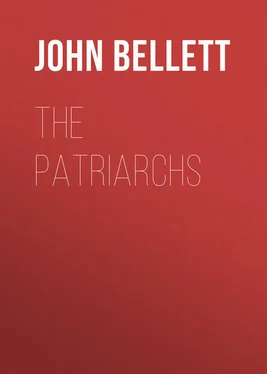John Bellett - The Patriarchs
Здесь есть возможность читать онлайн «John Bellett - The Patriarchs» — ознакомительный отрывок электронной книги совершенно бесплатно, а после прочтения отрывка купить полную версию. В некоторых случаях можно слушать аудио, скачать через торрент в формате fb2 и присутствует краткое содержание. Жанр: foreign_antique, foreign_prose, Биографии и Мемуары, на английском языке. Описание произведения, (предисловие) а так же отзывы посетителей доступны на портале библиотеки ЛибКат.
- Название:The Patriarchs
- Автор:
- Жанр:
- Год:неизвестен
- ISBN:нет данных
- Рейтинг книги:4 / 5. Голосов: 1
-
Избранное:Добавить в избранное
- Отзывы:
-
Ваша оценка:
- 80
- 1
- 2
- 3
- 4
- 5
The Patriarchs: краткое содержание, описание и аннотация
Предлагаем к чтению аннотацию, описание, краткое содержание или предисловие (зависит от того, что написал сам автор книги «The Patriarchs»). Если вы не нашли необходимую информацию о книге — напишите в комментариях, мы постараемся отыскать её.
The Patriarchs — читать онлайн ознакомительный отрывок
Ниже представлен текст книги, разбитый по страницам. Система сохранения места последней прочитанной страницы, позволяет с удобством читать онлайн бесплатно книгу «The Patriarchs», без необходимости каждый раз заново искать на чём Вы остановились. Поставьте закладку, и сможете в любой момент перейти на страницу, на которой закончили чтение.
Интервал:
Закладка:
The contents of this little volume, which I have now closed, might be given in the following order:
vi. – viii. These chapters present the sin and judgment of the earth, with the election, faith, and deliverance of the saints in the midst of it all, and out of it all.
ix. This chapter shows us the new condition of man in the new world, endowed and enriched there by the God of heaven and earth, secured in the covenant mercy, and made the representative and executor of divine authority.
x. xi. These chapters unfold great portions of the history of the new world, the springs, workings, progress, and maturity of evil, leaving or rendering the earth such a place as that the Lord must again, a second time, retire from it (at least for the present) and bring out from it, also a second time, a people to be heavenly strangers in the midst of it, like the antediluvian saints.
Heaven and earth have thus, in their season, been rehearsing the mystery, till together, in coming days, the days of the glory, they shall display it, when "at the name of Jesus every knee shall bow, of things in heaven, and things in earth, and things under the earth; and every tongue confess that Jesus Christ is Lord, to the glory of God the Father."
"The land shall not be sold for ever," says the Lord; "for the land is mine." Lev. xxv. 23. Man has a term of years granted him, in which it is left in his power to disturb the divine order. For forty-nine years in Israel disturbing traffic might go on, but in the fiftieth year the Lord asserted His right, and restored all things according to His own mind; for it was a time of "refreshing" and of "restitution" as from His own "presence."
Bright and happy expectation! "The earth is the Lord's, and the fulness thereof," is the proclamation of Psalm xxiv. And then the challenge goes forth, "Who shall ascend into the hill of the Lord?" – that is, Who shall take the government of this earth and its fulness? And the answer is made by another challenge to the city gates, to lift up their heads to the Lord of hosts, the King of glory; a fervent form of words whereby to convey the truth, that the Lord, as in strength and victory, the Lord as Redeemer and Avenger, should take the government. As again in Rev. v. a like proclamation is heard, "Who is worthy to open the book, and to loose the seals thereof?" And the answer from every region is this, "The Lamb that was slain, the Lion of the tribe of Judah." He who sat on the throne gave that answer by letting the Book pass from His hand into the hand of the Lamb. The living creatures and crowned elders joined in that answer by singing their song over the prospect of their reign over the earth. The hosts of angels add to it, by ascribing all wisdom and strength and honour and faculty of dominion unto the Lamb-and every creature in heaven, on earth, under the earth and in the seas, in their order and measure, join in uttering this same answer. The title of the Lamb to take dominion in the earth is thus owned and verified in the very place where alone all lordship or office could be rightly attested-the presence of the throne in heaven.
And so it is. The nobleman has now gone into the distant country to get for himself a kingdom. Jesus, who refused all power from the god of this world (Matt. iv.), or from the desire of the multitude (John vi.), takes it from God, as He owns in Psalm lxii. that to Him it belongs. And in due season He will return, and those who have owned Him in the day of His rejection shall shine with Him in the day of His glory; those who have served Him now shall take another city with Him then.
In the prospect of such a day, Paul says to Timothy, "Keep this commandment without spot, unrebukeable, until the appearing of our Lord Jesus Christ: which in His time He shall show, who is the blessed and only potentate, the King of kings, and Lord of lords." And in the like prospect the same dear apostle could say of himself, "I have fought a good fight, I have finished my course, I have kept the faith; henceforth there is laid up for me a crown of righteousness, which the Lord, the righteous Judge, shall give me at that day; and not to me only, but unto all them also that love His appearing."
May the Lord give our poor hearts-for they need it much-more of the like spirit of faith and power of hope! Amen.
ABRAHAM.
GENESIS XII. – XXV
In earlier parts of the book of Genesis, I have already traced two distinct histories-that of the antediluvian saints, or the times from Adam to Enoch; and that of Noah and of those who followed him, down to the scattering of the nations.
The first of these histories occupies chapters i. – v., the second, vi. – xi.
In the chapter which follows-xii. – the story of Abraham begins, and is continued down to chap. xxv. This forms the third portion or section of the book of Genesis, and presents to us a new era in the ways of God. And in all this, I am sure, there is beautiful moral order, and an unfolding of the dispensational wisdom of God. For in these things the heavens and the earth are made, by turns, to take up the wondrous tale of that wisdom, and to rehearse divine mysteries-such mysteries as, "in the fulness of time," will be accomplished, when, as we know, He shall gather together in one all things in Christ, both which are in heaven and which are on earth. Eph. i. 10.
Adam in innocency was a man of the earth. He had to enjoy it, knowing it all as his, but knowing nothing as his beside. But when he was sent out of Eden, he became a stranger in the earth. He received no commission to improve or furnish it. He had simply to till the ground for a living, and the translation of Enoch tells us, that the destiny and inheritance of that earliest household of God was heavenly . 9 9 The family of Cain was the contradiction of this, in those antediluvian days. They tilled the ground for something more than livelihood. Their tillage led to the culture and advancement of the world as a system of gain and pleasure. And thus were the two families distinguished-the one was formed by faith, or by obedience to the revelation of God; the other by the despite of it, as the world is to this day.
In Noah, however, in process of time, the purpose of God is different. Noah is a man of the earth again. He leaves the ark in a character very different from that in which Adam had left the garden. Noah left the ark under commission to keep the world in order, as judge and ruler. It was not strangership on it, but citizenship in it, and government of it, that was now again the divine thought. But a second apostasy was witnessed in the midst of Noah's descendants. In process of time, they affected independency in the earth, casting off the fear of God, and seeking to do for themselves without Him, as Adam had (seeking to be as God) in the garden of old.
Abraham, upon all this, finds grace in the eyes of the Lord. He is called out from this apostate scene; and, as we might expect, from this alternate telling of heavenly and earthly mysteries, after Noah the man of the earth, Abraham is called to be a heavenly man.
The Lord said to him, "Get thee out of thy country, and from thy kindred, and from thy father's house." This was the character of the call of Abraham. It was not a call from moral pollution, or from idolatry, or the like; it was a call from the associations of nature and of the earth. There were idols to be left, I doubt not. See Joshua xxiv. 2, 3. But it was not the leaving of them that constituted the nature of the call. Yet Abraham, touching the earth, was to be like Adam outside the garden. He leaves Ur of the Chaldees, as Adam left Eden. He received no commission to cultivate the land of Canaan for the Lord, or to conquer and govern the people there. The arrangements of the world were left just as they were. Abraham had nothing to say to the nations through which he passed on his way to Canaan; and when he reached that land, he found the Canaanite there, and there he left him as he found him.
Читать дальшеИнтервал:
Закладка:
Похожие книги на «The Patriarchs»
Представляем Вашему вниманию похожие книги на «The Patriarchs» списком для выбора. Мы отобрали схожую по названию и смыслу литературу в надежде предоставить читателям больше вариантов отыскать новые, интересные, ещё непрочитанные произведения.
Обсуждение, отзывы о книге «The Patriarchs» и просто собственные мнения читателей. Оставьте ваши комментарии, напишите, что Вы думаете о произведении, его смысле или главных героях. Укажите что конкретно понравилось, а что нет, и почему Вы так считаете.












